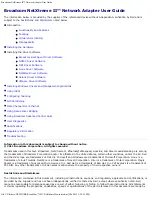
Functionality and Features: Broadcom NetXtreme II Network Adapter User Guide
file:///T|/htdocs/NETWORK/BroadCom/71921/NetXtremeII/en/features.htm[9/26/2012 3:28:28 PM]
throughput. When traffic is light, the adapter driver interrupts the host for each received packet, minimizing latency. When
traffic is heavy, the adapter issues one host interrupt for multiple, back-to-back incoming packets, preserving host CPU
cycles.
ASIC with Embedded RISC Processor
The core control for Broadcom NetXtreme II adapters resides in a tightly integrated, high-performance ASIC. The ASIC
includes a RISC processor. This functionality provides the flexibility to add new features to the card and adapts it to future
network requirements through software downloads. This functionality also enables the adapter drivers to exploit the built-in
host offload functions on the adapter as host operating systems are enhanced to take advantage of these functions.
Broadcom Advanced Control Suite
Broadcom Advanced Control Suite (BACS) is an integrated utility that provides useful information about each network adapter
that is installed in your system. The BACS utility also enables you to perform detailed tests, diagnostics, and analyses on
each adapter, as well as to modify property values and view traffic statistics for each adapter.
Supported Operating Environments
The Broadcom NetXtreme II adapter has software support for the following operating systems:
Microsoft
®
Windows
®
(32-bit and 64-bit extended)
Linux
®
(32-bit and 64-bit extended)
MS-DOS
®
ESX Server (VMware)
NetWare
®
Oracle Solaris
SCO
®
UnixWare
®
SCO OpenServer
®
Network Link and Activity Indication
For copper-wire Ethernet connections, the state of the network link and activity is indicated by the LEDs on the RJ-45
connector, as described in
Table 1
. For fiber optic Ethernet connections and SFP+, the state of the network link and activity is
indicated by a single LED located adjacent to the port connector, as described in
Table 2
. Broadcom Advanced Control Suite
also provides information about the status of the network link and activity (see
Viewing Vital Signs
).
Table 1: Network Link and Activity Indicated by the RJ-45
Port LEDs
Port LED
LED Appearance
Network State
Link LED
Off
No link (cable disconnected)
Continuously illuminated Link
Activity LED
Off
No network activity
Blinking
Network activity
Table 2: Network Link and Activity Indicated by
the Port LED
LED Appearance
Network State
Off
No link (cable disconnected)
Continuously illuminated Link
Blinking
Network activity
Please read all
Restrictions and Disclaimers
.






































